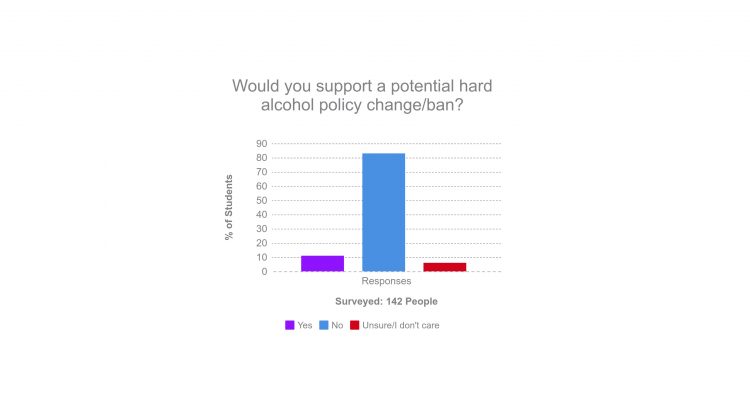In response to years of observing the effects of the consumption of hard alcoholic products and the measures taken by others schools to curtail this dilemma, the University has begun researching a possible change to the policy regarding its possession.
On Monday, Nov. 6, the Fairfield University Student Association sent out an email about their initiative to research the thoughts of the Fairfield student body in terms of how they perceive the use of hard alcohol on campus and whether or not it is a problem that needs to be tackled head-on.
According to the email sent by FUSA, the potential change, “would affect the consequences for the possession of hard alcohol.” Furthermore, “the Fairfield University Hard Alcohol and Other Drugs Committee determined that further research into this phenomenon was necessary.”
Across the United States, colleges and universities such as Dartmouth, Colby and Stanford have researched the effects of hard alcohol possession on their respective campuses, hence representatives from Fairfield have reached out to them for preliminary research to see how the policy affected their schools.
One of the most notable correlations regarding hard alcohol use was between it and the rate of sexual assault on college campuses, as per the email.
Junior Nicholas Lanni, who sits on the community development board, was asked to be on the drugs and alcohol committee with faculty and administration, representing FUSA. He stated that, “During this meeting, we discussed the hard alcohol policy and where to go from there. Dean Johnson suggested a survey and this is what I created to gauge the feelings of the students on this subject.”
Regarding the results of the FUSA initiative, the survey (out of 701 respondents) indicated that 66.19 percent of students are strongly opposed to a potential change of the University’s hard alcohol policy, with a further 19.97 percent being opposed as well.
In terms of what inspired the University to research a potential change to the policy regarding the possession and consumption of hard alcohol, Lanni noted that “the school realized that a lot of the high-risk drinking activities that were going on on campus involved hard alcohol.” He further went on to say that he had heard almost 100 percent of the transports over the past three years involved a student who had consumed hard alcohol.
He added that schools such as Dartmouth, Stanford and Colby college have banned hard alcohol on their campuses and have seen a decrease in the overall amount of transports that have occurred, which they believe to correlate to a reduced level of high-risk drinking.
One student, Jaclyn Cuculino ‘20, felt as though, “The proposed ban on hard alcohol sounds ridiculous. We don’t attend a dry University. If the government can trust people 21 and over to consume hard beverages, so can the University.”
It is worth noting that despite the legal age to consume and purchase alcohol being 21 across all 50 states, on campus, however, it would be prohibited for those 21 years of age and over to be in possession of hard alcohol as well.
Cuculino further noted that, “The majority of transports are underclassmen and the upperclassmen should not be punished for that.”
Another student, Bridget Belfiore ‘18, felt as though, “I would say I disagree, mainly because I understand hard alcohol is more risky and can potentially be more dangerous than non-hard alcohol, but I think alcohol is alcohol.”
She went on to say that, “if you are over the age of 21, you should be able to drink what you want, so I don’t think that they have a right to ban it.”
Lanni further pointed out, “I think that with President Nemec coming in, he wants to assure that everyone is safe on campus and that is what really inspired the potential change to the policy.”
In terms of the potential reform to the consequences surrounding the possession of hard alcohol, Lanni noted that the University has not discussed it yet and such talks “will only happen when it comes to fruition.”
In the case of Dartmouth College, you get one warning, but the second time one is caught with the possession of hard alcohol, they are suspended. Lanni added that, “I don’t know if it will be as strict here, as that is entirely up to the administration.”
For now, the University is simply looking into the possibility of a ban with the knowledge of years of research surrounding hard alcohol’s effects on the conduct of students on campus, hence FUSA put out this initiative in order to get a feeling as to how the student body would feel about a potential change to the way in which the University tackles the matter of the use of hard alcohol.


Leave a Reply